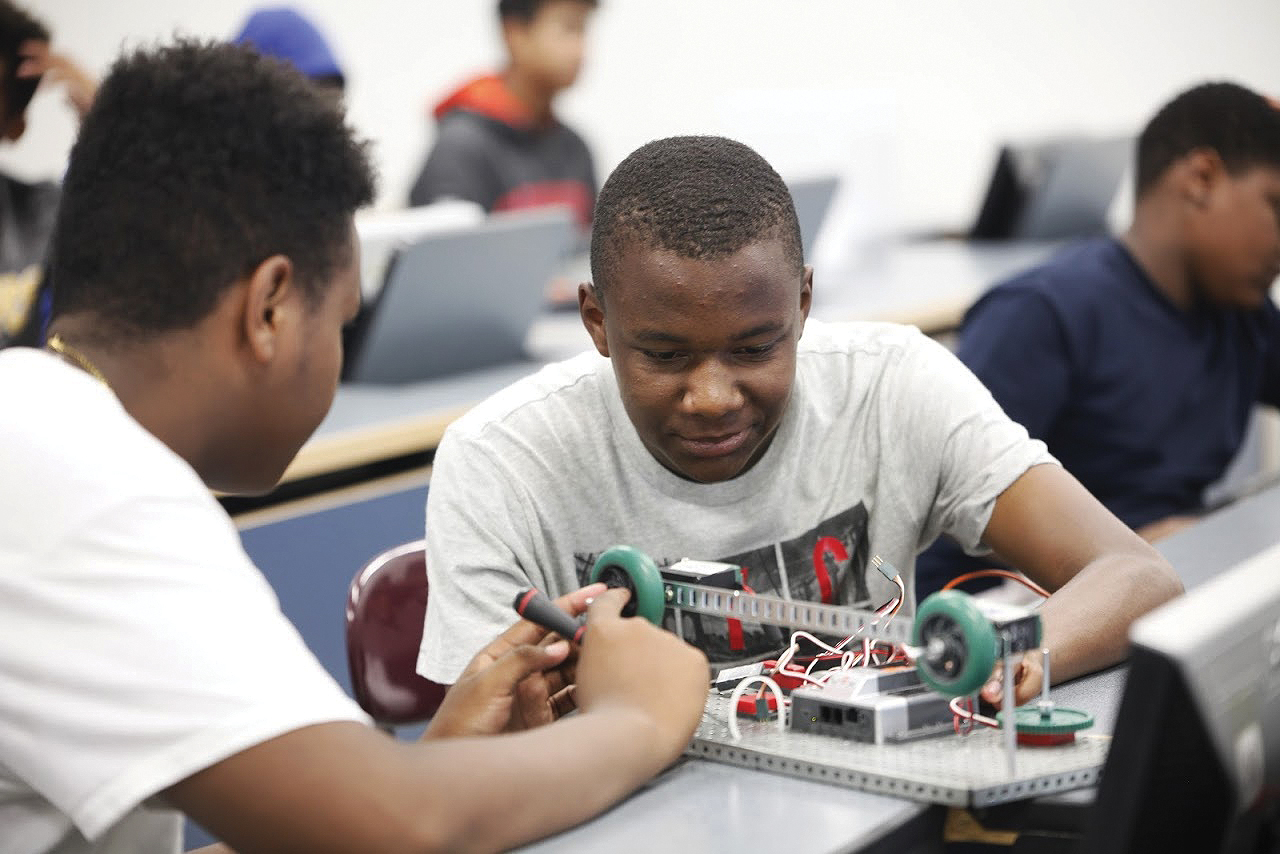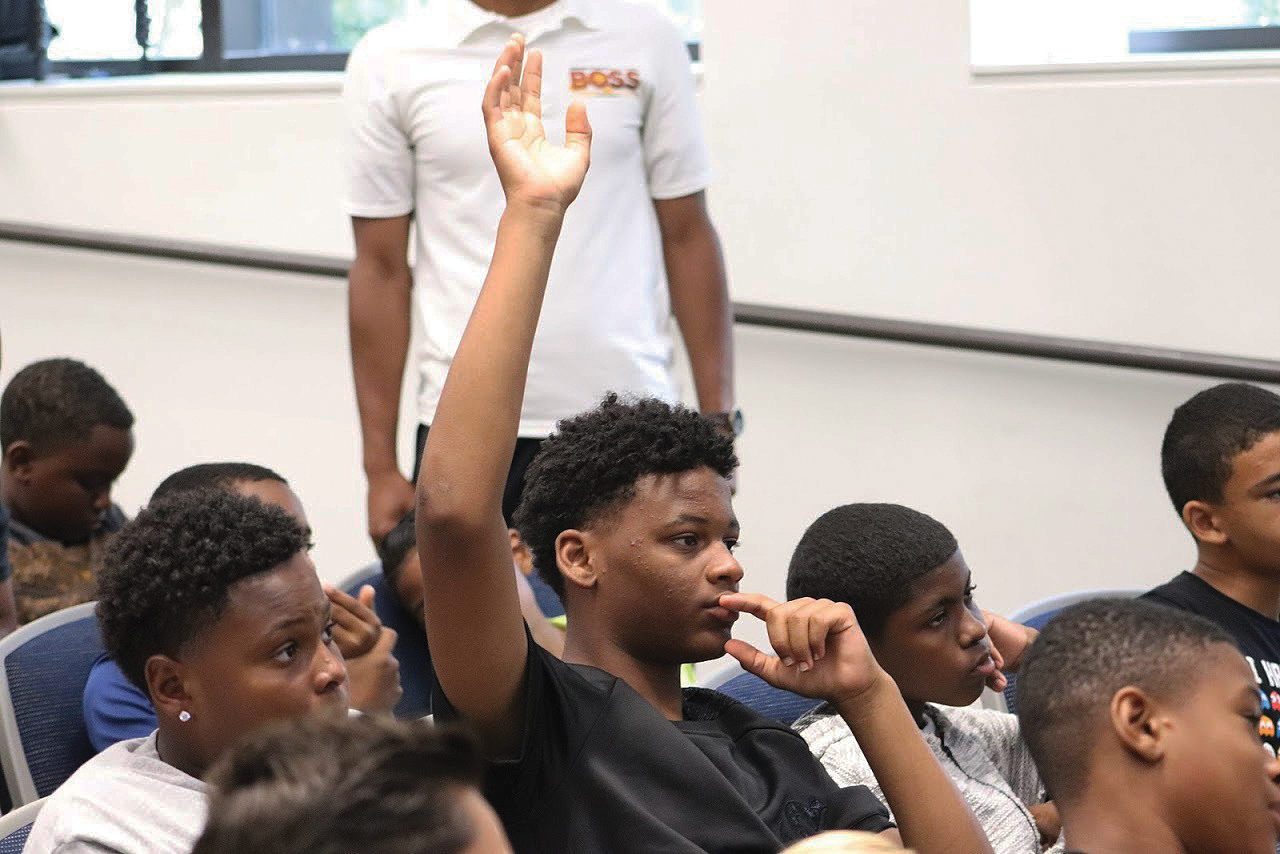
It was a single number that prompted Everett Glenn to start BOSS, the Business of Student Success program, six years ago: 72.8%. That’s the percentage of male African-American students in Long Beach public schools who graduated high school without meeting the requirements to enroll in either of the state’s public university systems that year.
Glenn, a corporate lawyer by training and the first Black attorney to work for Long Beach’s city attorney’s office from 1996 to 2006, was shocked. “I’m not the kind of guy to find out something like that and just go back to normal,” he said.
Now, six years into its existence, the BOSS program has grown from two summer camps with roughly 20 boys in attendance to an educational and career support program serving 200 students. Earlier this month, U.S. Rep. Alan Lowenthal, D-Long Beach, announced that the House Appropriations Committee had approved $50,000 in federal funding for the program. Next the funding will go to the full House for a final vote.
If passed, this money could fund year-round programming for 20 more students, Glenn estimated. “It would be huge,” he said.
In addition to working at the local city attorney’s office, Glenn’s resume includes positions with the federal government and assisting draft picks for the NFL and NBA in contract negotiations. The 68-year-old’s achievements show little trace of the challenges he faced as a young Black man striving for a professional career.
Growing up in Cleveland in the 1960s and 1970s, Glenn said there was little encouragement to be found from educators or from the realities of his inner-city neighborhood. “There was about three guys on the block who went to college, about 20 who went to jail,” he remembers. “I grew up with failure stamped on my forehead.”’

The same is true for many of the students struggling to close the educational achievement gap here in Long Beach today, Glenn said. “It’s not inherent,” he noted. “Nobody thought it was important to try to inspire them.”
Scoring high on a standardized test in 6th grade and being sent to a summer program at Oberlin College, a prestigious liberal arts school just outside of Cleveland, is what set Glenn on a path to success, he said. Now he’s hoping to do the same for the mostly Black and Latino boys served by BOSS.
Before the pandemic, students in the program were placed in internships with companies like the Anschutz Entertainment Group, the world’s largest owner of sports teams and sports events. AEG Community Foundation Director Erikk Aldridge, who leads the company’s collaboration with BOSS, said he has been nothing short of impressed by the nonprofit’s work.
“The work that they’re doing, the passion with which they do it is top notch. You can see it in the young people that they serve,” Aldridge said. “You can see that someone has had an impact on how they think about life.”
Aldridge, an Inglewood native and former UC San Diego baseball player, said he’s glad to see an organization like BOSS laying the groundwork to help young Black men succeed, especially in his industry.
“For a company like ours and an individual like me, who works in sports and entertainment, I see the impact that Black people have in those industries,” he said. “It’s great to see that the challenges facing Black boys are being addressed.”
During the pandemic, BOSS—like everyone else—had to find new ways to engage with the students it serves. To do so, the nonprofit offered a virtual speaker series featuring Black professionals from a variety of industries and weekly check-ins with academic coaches for each individual student.
The restrictions of the pandemic, Glenn said, presented obstacles but also opportunities. One benefit, he noted, was that the virtual format allowed speakers from all over the country to participate, some of whom wouldn’t have been able to travel to Long Beach. It also made one-on-one tutoring easier.
“We don’t have to travel to make it available to you. Our tutors can be in their homes. So we were actually able to increase our engagement,” Glenn said. “Nothing replaces in-person, but you can still take advantage.”
Ryan Ballard, whose two sons Dylan and Emile are BOSS students, said he was extremely impressed with the program. “I think it’s affecting them in a very significant way,” he said, adding that even as a parent, he likes to listen in on the speaker series for pointers and inspiration.
“All of them are sharing their experiences in a practical way,” he said of the speakers selected. “Everything is applicable—we’re talking about real life.”
In the area of academic achievement, the program is showing results. According to data from the Long Beach Unified School District, students in the program outperformed their peers in several areas, including attendance and grade point average.
In the 2018-2019 school year, 66% of BOSS participants had a grade point average of 3.0 or above, compared to 42% of all male African-American and Hispanic students in grades 6-8.
The LBUSD data, Glenn said, shows the impact this approach can have on those students. “These guys are going to be husbands and fathers, employees or entrepreneurs,” he said. “The country cannot remain globally competitive and upwardly mobile if there’s so many lost opportunities.”
